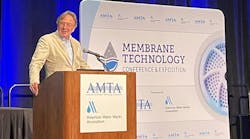By Andy Fraher
In April 2015, the Water and Wastewater Equipment Manufacturers Association (WWEMA) participated in a procurement council panel discussion at the U.S. Chamber of Commerce in Washington, D.C. The topic, "The impact of ‘Buy American' on Federal and state public works projects," was timely in that discussions have begun on the 2016 Appropriations bills, and we are already beginning to see signs of more stringent requirements than what were initially imposed -- and then later clarified -- by the U.S. Environmental Protection Agency (EPA) as part of the 2015 State Revolving Fund (SRF) American Iron and Steel (AIS) provisions.
The panel was moderated by Hope Andrade, former Texas Secretary of State and now CEO of North America Trading Together, and the panel members spanned the broad spectrum of the industry, including Gary Hufbauer, Senior Fellow at the Peterson Institute for International Economics; Dragon Stojanovic, Chair of the Infrastructure Division of the Associated General Contractors; Brett Guge, Executive VP of the California Steel Industries; and Andy Fraher, Director of Marketing and Business Development, North America, for Xylem and Chair of the WWEMA Buy American Subcommittee. The audience represented a large cross-section of infrastructure stakeholders, from industry trade associations to manufactured goods companies to both small and large steel companies, to name a few.
From the opening statements, it was apparent that there are strong sentiments across the stakeholders as to the benefits and potential challenges of implementing these provisions. Certain themes began to emerge along the lines of the inequities of global local content requirements and the need to level the playing field, as well as the global nature of supply chains and the inconsistencies of the application of these rules to the various points along the supply chain.
WWEMA has been opposed to "Buy American" since it first appeared in the American Recovery and Reinvestment Act (ARRA) of 2009. As highlighted above, many technology providers within the water and wastewater industry utilize global supply chains so as to be cost-competitive while maintaining the ability to invest in research and development of new and innovative technologies. Additionally these companies do business in countries other than the U.S., and are subjected to similar local content restrictions that are imposed in response to "Buy American" types of restrictions. It should also be pointed out that WWEMA members employ a large number of employees and maintain numerous assembly and manufacturing operations within the U.S.
It has also been shown that, contrary to some of the stakeholders' comments, costs can increase on projects with "Buy American" requirements as evidenced by a 2015 water pipeline project in Wrightstown, Wis. Here, the municipality was able to demonstrate an $800K savings on a $7M project by choosing to go with a more open, less restrictive specification that allowed foreign-made materials. A February 2015 article in the Green Bay Gazette entitled "Foreign Parts Could Save Wrightstown on Water Pipeline" detailed how they were able to secure the lower project price, and added that "members of the Village Board must decide whether to take the savings or spend more money to support American manufacturers when building a pipeline to Green Bay's municipal water system."
In a 2013 report, the EPA identified a $384B drinking water infrastructure need over 20 years, and a similar report conducted in 2008 for clean water estimates that need to be approximately $322B. Given the level of investment required and the scarcity of funding to do this work, we need to ensure that we are not creating additional costs on projects, most importantly so that these savings can be put to use funding other projects. The need for a leadership role globally on local content issues is critical in that it can ensure a competitive and fair environment and enable companies to provide innovative solutions, resulting in lower costs and better overall solutions to the nation's infrastructure needs. WWEMA looks forward to continuing the discussion on how we can collectively, as an industry, maximize our investment in U.S. water and wastewater infrastructure.
About the Author: Andy Fraher is Director of Marketing and Business Development, North America, for Xylem Inc., a member of the WWEMA Board of Directors, and Chair of the WWEMA Buy American Subcommittee.


